On 22 Apri 2021, the CDP held their inaugural EBP Conference "Moving the Needle for Military Mental Health: Innovations in Training and Practice." This day-long conference showcased novel enhancements to professional EBP training intended to increase learner retention of information, and facilitate ease of use and fidelity to treatment protocols.
Click here to visit the 2025 EBP Conferece Archive
Click here to visit the 2024 EBP Conferece Archive
Click here to visit the 2023 EBP Conferece Archive
Click here to visit the 2022 EBP Conferece Archive
If you weren't able to join us for the live event, we are happy to be able to provide recordings of each of the presentations. Click on any of the below titles to view a video of the presentation. Please note, the below recordings are for informational purposes only and do NOT include CE credits.
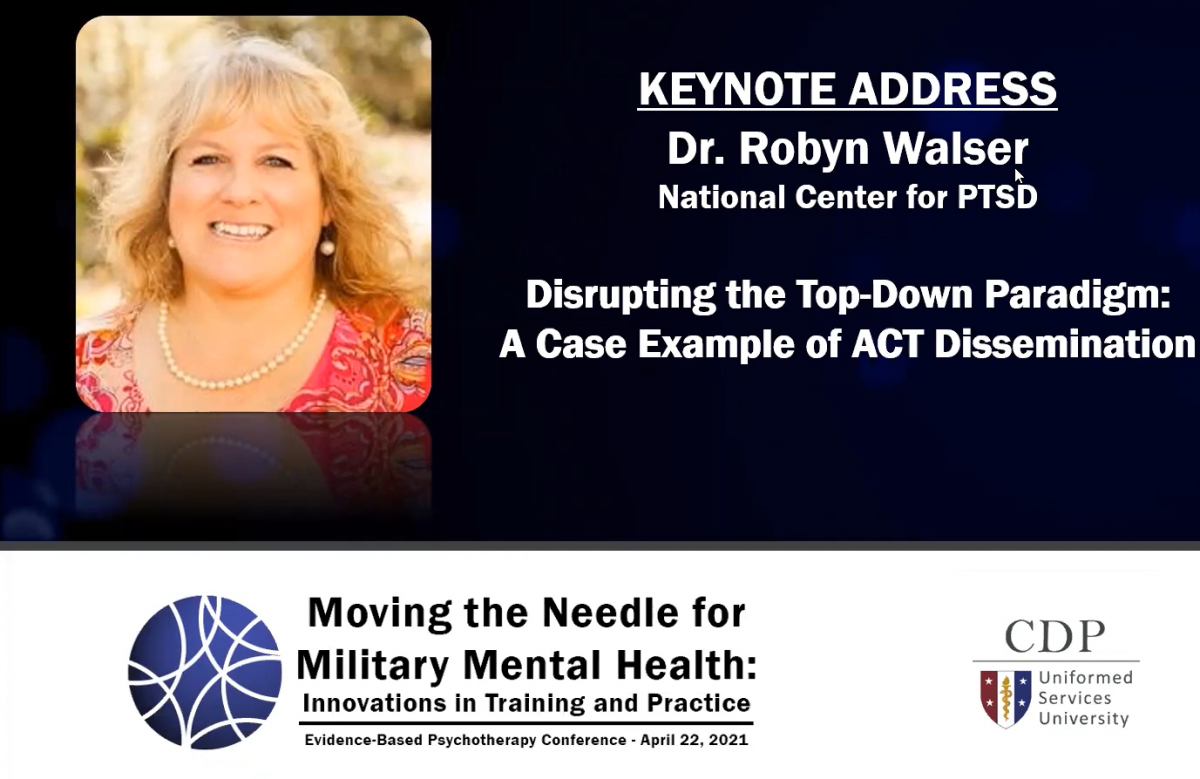 Introduction and Disrupting the Top-Down Paradigm: A Case Example of ACT Dissemenation Dr. Bill Brim provides an introduction for the EBP conference, followed by Robyn Walser, Ph.D., National Center for PTSD. The dissemination and implementation of scientifically supported clinical interventions are paramount to best practice and the promotion of well-being among those who suffer from psychological and emotional challenges. Optimizing public health means not only understanding the mechanisms and processes by which individuals come to suffer and recover, but it also means ensuring the effective dissemination and implementation of the evidence-based practice (EBP) designed to reduce suffering and promote recovery. Read more...
Introduction and Disrupting the Top-Down Paradigm: A Case Example of ACT Dissemenation Dr. Bill Brim provides an introduction for the EBP conference, followed by Robyn Walser, Ph.D., National Center for PTSD. The dissemination and implementation of scientifically supported clinical interventions are paramount to best practice and the promotion of well-being among those who suffer from psychological and emotional challenges. Optimizing public health means not only understanding the mechanisms and processes by which individuals come to suffer and recover, but it also means ensuring the effective dissemination and implementation of the evidence-based practice (EBP) designed to reduce suffering and promote recovery. Read more...
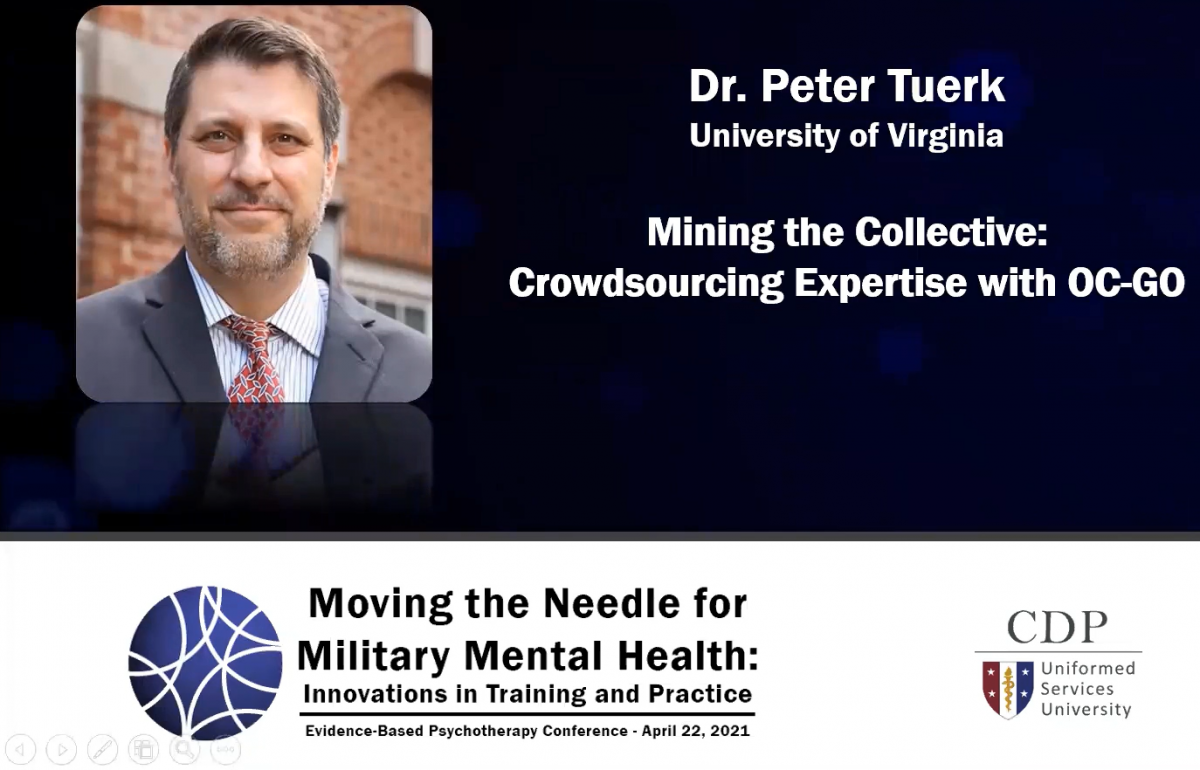 Mining the Collective: Crowdsourcing Expertise with OC-GO by Peter Tuerk, Ph.D., Sheila C. Johnson Center for Clinical Services, University of Virginia: A brief introduction to current and leading-edge asynchronous technologies in the mental health space will be presented to provide a backdrop for the larger discussion and demonstration of OC-Go, a free crowdsourcing telehealth tool created with NIH funding. The program will identify the recalcitrant barriers to exposure therapy dissemination and high-fidelity implementation, which served to inform the technology design process. Participants will also learn about “agile” software development, usability, and the field-testing framework that supported OC-Go’s development by psychologists for psychologists.. Read more...
Mining the Collective: Crowdsourcing Expertise with OC-GO by Peter Tuerk, Ph.D., Sheila C. Johnson Center for Clinical Services, University of Virginia: A brief introduction to current and leading-edge asynchronous technologies in the mental health space will be presented to provide a backdrop for the larger discussion and demonstration of OC-Go, a free crowdsourcing telehealth tool created with NIH funding. The program will identify the recalcitrant barriers to exposure therapy dissemination and high-fidelity implementation, which served to inform the technology design process. Participants will also learn about “agile” software development, usability, and the field-testing framework that supported OC-Go’s development by psychologists for psychologists.. Read more...
Read the supplemental Q&A PDF here.
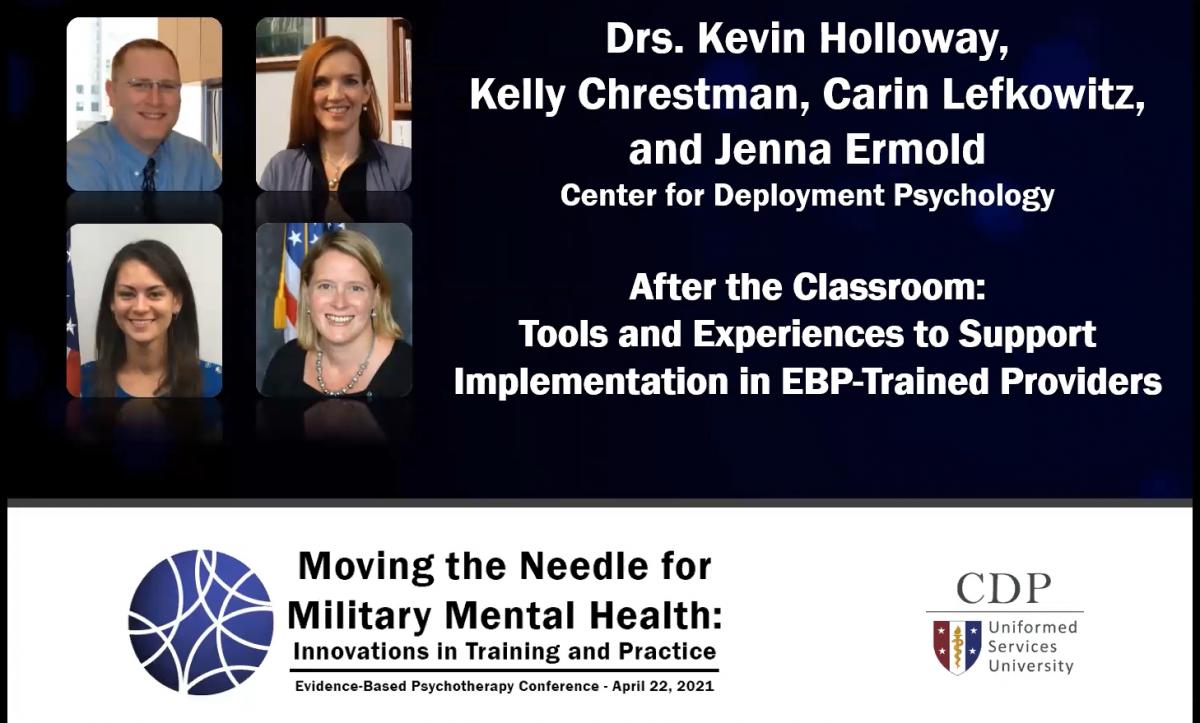 After the Classroom: Tools and Experiences to Support Implementation in EBP-Training Providers by Kelly Chrestman, Ph.D., Kevin M. Holloway, Ph.D., Carin Lefkowitz, Psy.D., and Jenna Ermold, Ph.D., Center for Deployment Psychology, Uniformed Services University: The famous author, H.G. Wells, wrote “We live in a world of unused and misapplied knowledge and skill”. This sentiment aptly applies to the challenges faced by our field as we strive to provide training in EBPs to practitioners, many of whom underutilize said protocols or may misuse them due to a lack of continued support. Read more...
After the Classroom: Tools and Experiences to Support Implementation in EBP-Training Providers by Kelly Chrestman, Ph.D., Kevin M. Holloway, Ph.D., Carin Lefkowitz, Psy.D., and Jenna Ermold, Ph.D., Center for Deployment Psychology, Uniformed Services University: The famous author, H.G. Wells, wrote “We live in a world of unused and misapplied knowledge and skill”. This sentiment aptly applies to the challenges faced by our field as we strive to provide training in EBPs to practitioners, many of whom underutilize said protocols or may misuse them due to a lack of continued support. Read more...
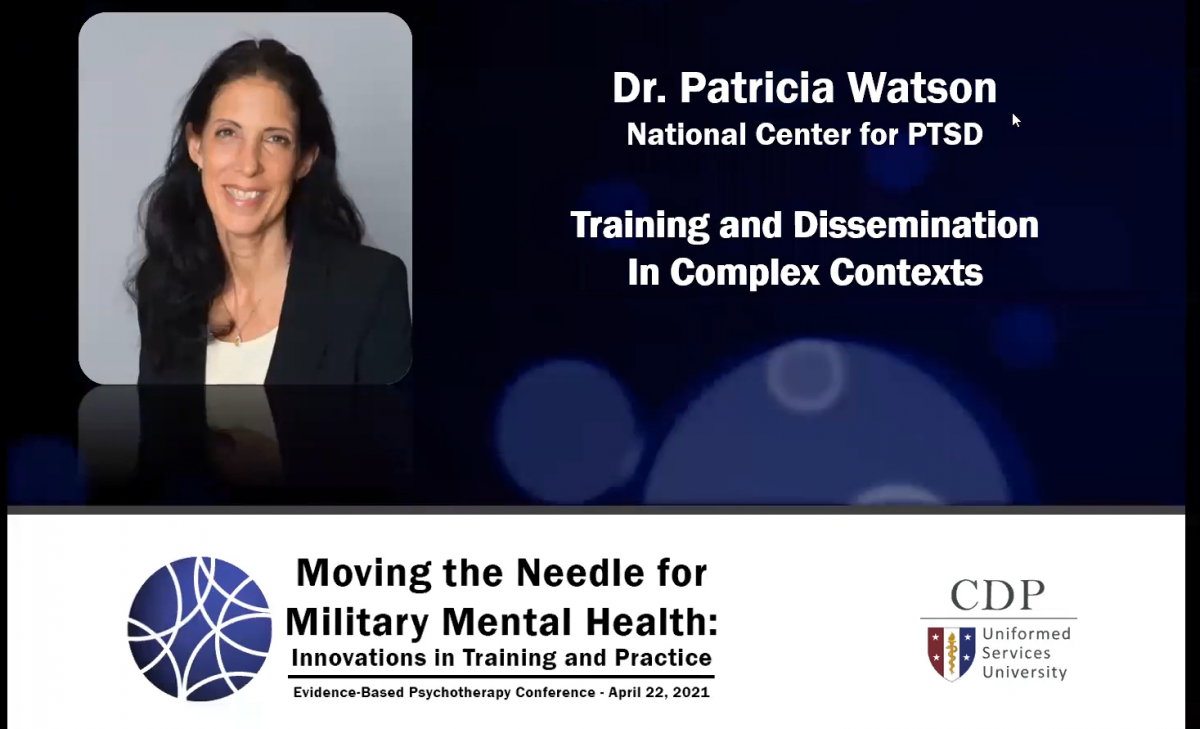 Training and Disemenation in Complex Contexts by Patricia Watson, Ph.D., National Center for PTSD: Offering evidence-informed resilience-building intervention training in complex contexts such as post-disaster, ongoing threat, and cross-cultural environments has resulted in a number of lessons learned. This presentation will focus on many of those lessons, such as how just-in-time training had to be developed to best accommodate rapid assimilation of early interventions upstream from evidence-based psychotherapies, to both professionals and paraprofessionals. Read more...
Training and Disemenation in Complex Contexts by Patricia Watson, Ph.D., National Center for PTSD: Offering evidence-informed resilience-building intervention training in complex contexts such as post-disaster, ongoing threat, and cross-cultural environments has resulted in a number of lessons learned. This presentation will focus on many of those lessons, such as how just-in-time training had to be developed to best accommodate rapid assimilation of early interventions upstream from evidence-based psychotherapies, to both professionals and paraprofessionals. Read more...
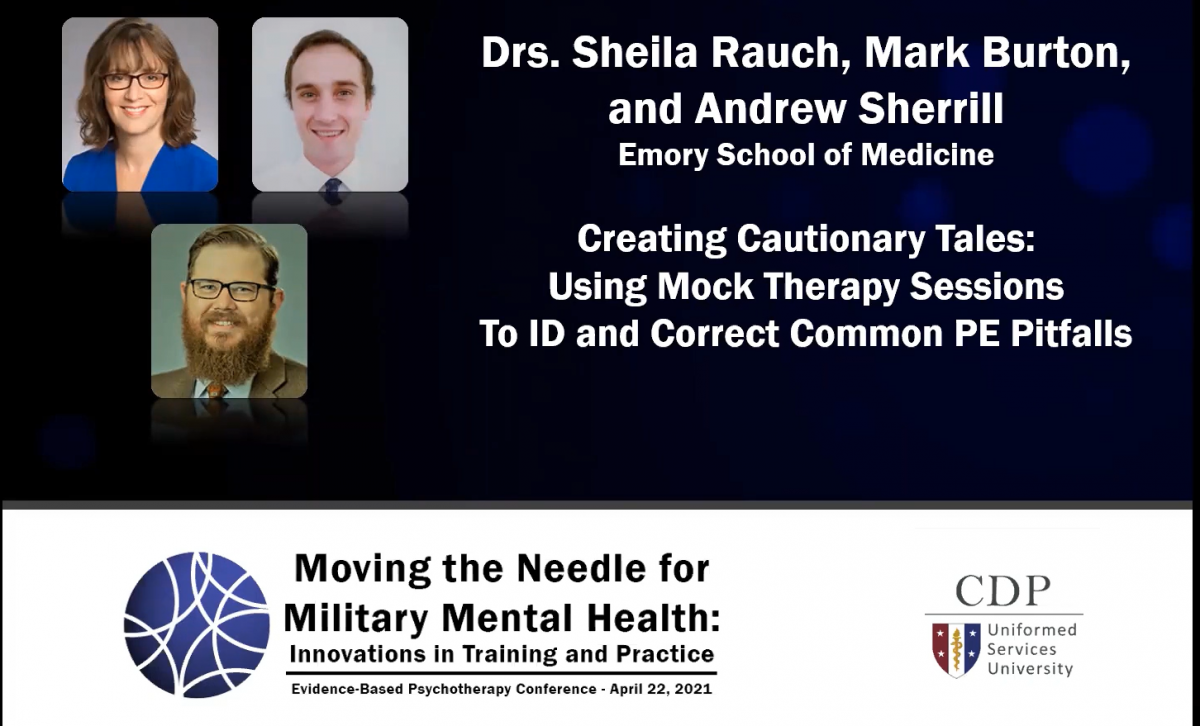 Creating Cautionary Tales: Using Mock Therapy Session to ID and Correct Common PE Pitfalls by Mark Burton, Ph.D., Andrew Sherrill, Ph.D., and Sheila Rauch, Ph.D., ABPP, Emory University: Prolonged exposure (PE; Foa et al., 2019) is a first-line treatment for PTSD (Cusack et al, 2016; Lee et al., 2016; APA, 2017; Institute of Medicine, 2007, 2014; VA/DOD, 2017). However, trained clinicians face many difficulties administering PE (Zoellner et al., 2011). This 60-minute webinar will be conducted by trainers of the Emory University Prolonged Exposure Consultant Training Program. Read more...
Creating Cautionary Tales: Using Mock Therapy Session to ID and Correct Common PE Pitfalls by Mark Burton, Ph.D., Andrew Sherrill, Ph.D., and Sheila Rauch, Ph.D., ABPP, Emory University: Prolonged exposure (PE; Foa et al., 2019) is a first-line treatment for PTSD (Cusack et al, 2016; Lee et al., 2016; APA, 2017; Institute of Medicine, 2007, 2014; VA/DOD, 2017). However, trained clinicians face many difficulties administering PE (Zoellner et al., 2011). This 60-minute webinar will be conducted by trainers of the Emory University Prolonged Exposure Consultant Training Program. Read more...
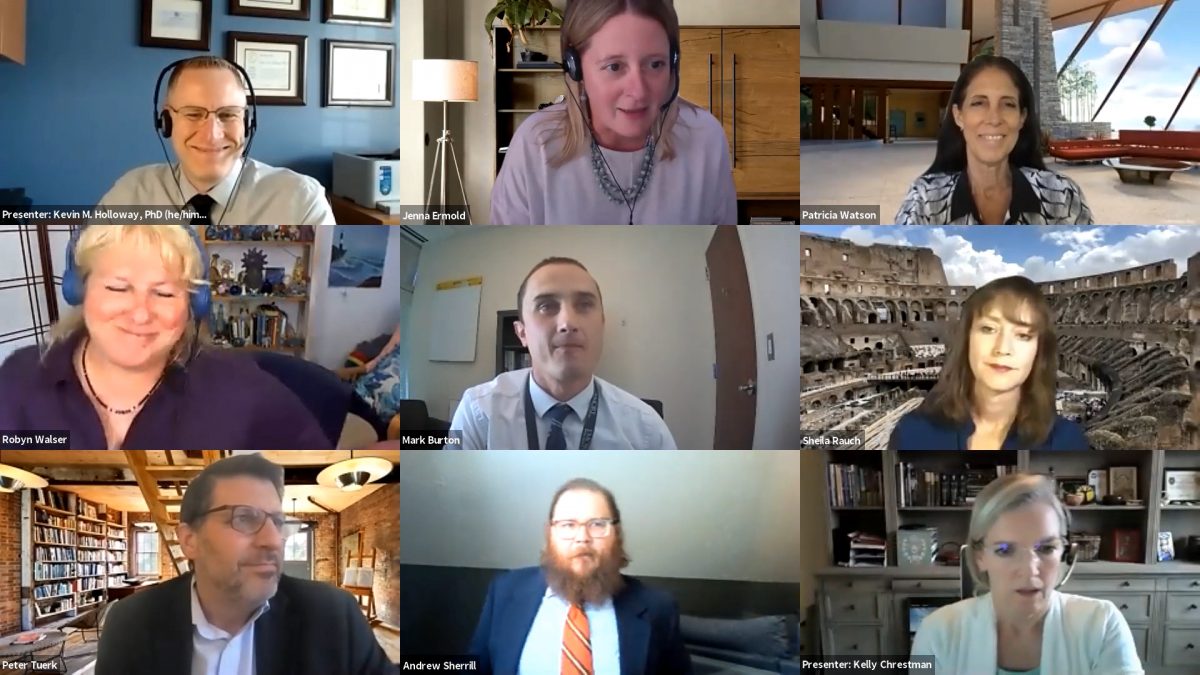 Maintaining Momentum with Training and Treatment in Turbulent Times Providing effective EBP training, consultation and support to learning communities poses challenges (e.g., resources, time, competing demands) during the best of times. Add in a pandemic, lock-downs, job losses, financial distress, heightened awareness and social unrest related to systemic racism, schools closings, devastating wildfires, storms, protests, a stressful presidential election (and we can't leave out the murder hornets) and the task could quickly become mission impossible. Read more...
Maintaining Momentum with Training and Treatment in Turbulent Times Providing effective EBP training, consultation and support to learning communities poses challenges (e.g., resources, time, competing demands) during the best of times. Add in a pandemic, lock-downs, job losses, financial distress, heightened awareness and social unrest related to systemic racism, schools closings, devastating wildfires, storms, protests, a stressful presidential election (and we can't leave out the murder hornets) and the task could quickly become mission impossible. Read more...
